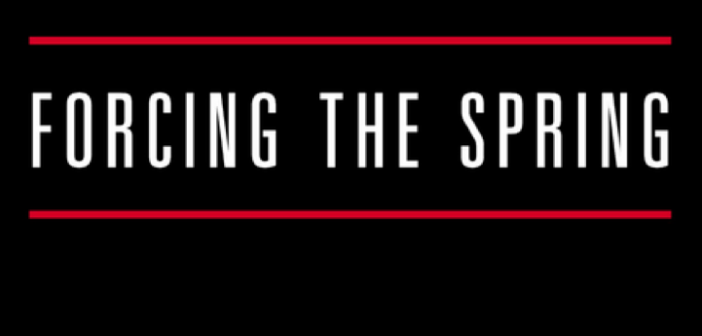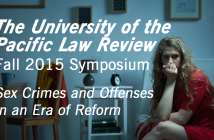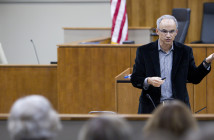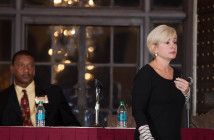On February 12, 2015, Pulitzer Prize winning journalist, Jo Becker, spoke about her book “Forcing the Spring: Inside the Fight for Marriage.” The book follows the case of Hollingsworth v. Perry, in which the Supreme Court indirectly validated gay marriage by holding that proponents of Proposition 8, which amended California’s Constitution to ban gay marriage, did not have standing to defend the constitutionality of Proposition 8.
Pacific McGeorge Professor Larry Levine and California District Court Associate Justice Therese Stewart, who played an integral role in the groundbreaking marriage cases as a San Francisco City Attorney, introduced Jo Becker.
Justice Stewart always thought there would be expansive rights for same sex couples, but wasn’t sure marriage would be possible.
Professor Larry Levine never thought he would see it in his lifetime.
Yet, it has happened. It has happened as a result of lawyers who were willing to challenge the law.
“This is how a revolution begins. It begins when someone grows tired of idly standing by, waiting for history’s arc to bend toward justice, and instead decides to give it a swift shove.”
This is how Jo Becker begins her book, which is a story of the fight for marriage equality and how litigation gave the swift shove towards equality. It is a story of the law, but also a very human story.
Becker noted that Hollingsworth v. Perry was a personal case for everyone involved, and for good reason. It was a case about discrimination against same-sex couples. “It’s the civil rights fight of my generation,” Becker said.
In 2009, when the litigation began, only 2 states allowed same-sex couples to marry. Now, 38 states allow same-sex marriages.
Becker spoke about how this drastic shift resulted directly from the Proposition 8 litigation. This wasn’t just another case for those involved. It was their life.
Justice Stewart joined the legal fight for gay marriage while serving as a San Francisco City Attorney. Stewart and her partner got involved after then Mayor of San Francisco, now Lieutenant Governor Gavin Newsom, introduced same-sex marriage in San Francisco and “just ran with it.”
“It was a very emotional time,” said Stewart’s partner. “We got married in the middle of the case and didn’t know if our marriage would be legal in two months.”
Ted Olson, one of the lead attorneys fighting against Proposition 8, strategized to move the case up the chain as quickly as possible. Becker did not think Olson wanted a trial, but Judge Walker, the federal judge who first heard the case, determined a trial was necessary to define the true discriminatory effect of same-sex marriage bans. .
The facts and testimony illuminated at trial were very impactful; they showed directly how Proposition 8 affected members of the LGBT community. On August 4, 2010, Judge Walker overturned Proposition 8, signaling a major victory.
A significant factor in the district court trial is that Judge Walker is gay. He announced his orientation after the case, and proponents of Proposition 8 called for Judge Walker to recuse himself and for the court to vacate its judgment, but their motion was denied.
Becker also highlighted Ted Olson’s unorthodox strategy. After winning the case in the Ninth Circuit Court of Appeals, Olson wanted the United States Supreme Court to hear the case right away. On the surface, this is unimaginable. What attorney wants to jeopardize a win for their side by appealing to the highest court?
According to Becker, Olson wanted the Supreme Court to rule in favor of gay marriage and provide a sweeping ruling. The Court did not supply the sweeping ruling Olson hoped for, but its technical ruling based on standing was still a victory.
Becker described the plane ride back to California after the Supreme Court victory as somber and bittersweet. “And this was a group that never missed a chance to toast. It wasn’t until we crossed the line back into California and someone shouted from the back of the plane, ‘We just crossed the line into California, where we are full and equal citizens,’ that the plain erupted in cheers.”
Charles Cooper, the attorney advocating for Proposition 8, maintained a “solid legal strategy” by targeting Justice Kennedy, who generally believes that society cannot tear down social institutions such as marriage. And according to Becker, Cooper’s strategy almost worked. She could tell by his statements and questions that Justice Kennedy was conflicted by this argument.
Cooper also made a wise decision, according to Becker and Stewart, by not calling experts or witnesses to testify in favor of Proposition 8. Those witnesses would have advanced the standard claim that gay marriage is a detriment to society. Yet Cooper realized this rhetoric would have played into his opponents’ hands by demonstrating the discriminatory nature of Proposition 8.
This case also became very personal for Charles Cooper. During the middle of the Ninth Circuit case, Cooper’s stepdaughter came out as a lesbian and wanted to marry her girlfriend. Although Cooper believed strongly in his legal argument, and despite losing in court, he admitted to Becker that he couldn’t help but rejoice in the plaintiffs’ happiness.
Becker and Stewart noted the level of professionalism from both sides of the litigation. After the case was over, Cooper called Becker and asked if she would invite the plaintiffs over for dinner with him and his wife. Becker did, but she made sure the plaintiffs were sitting down when she asked them. They accepted graciously.
In 2015, the Supreme Court will hear four cases to decide the power states have to ban same-sex marriage. Justice Ginsburg recently indicated in an interview that she believes Americans are ready.
“The change in people’s attitudes on that issue has been enormous,” Ginsburg said. “In recent years, people have said, ‘This is the way I am.’ And others looked around, and we discovered it’s our next-door neighbor — we’re very fond of them. Or it’s our child’s best friend, or even our child. I think that as more and more people came out and said that ‘this is who I am,’ the rest of us recognized that they are one of us.”
Once the Supreme Court rules, we will have a decisive answer about the legality of same-sex marriage.




